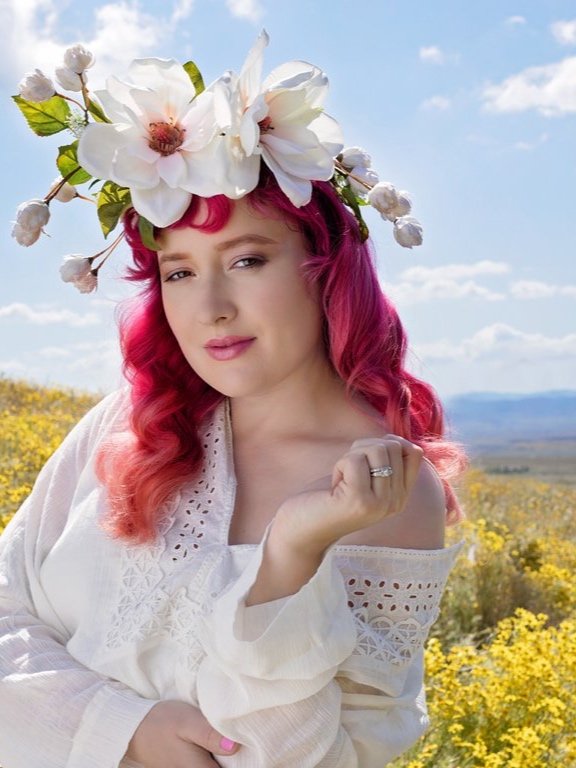Feel-good gardening: Growing Grounds Farm nurtures plants and good spirits
LUSH
In business since 1984, San Luis Obispo-based Growing Grounds offers California natives, Mediterranean perennials, succulents, restoration and mitigation plants, a wide variety of grasses, and a selection of perennial herbs.
PHOTO BY HAYLEY THOMAS CAIN
Craig Wilson has a knack for making things grow.
Not just guava trees, lavender, strawberries, or native grasses—which, with the help of his team, he does grow prolifically. The green thumb also facilitates real growth in the hearts and minds of his staff, many of whom are on the long and winding road to mental health recovery.
I sat down with the program manager of Transitions-Mental Health Association’s (TMHA) Growing Grounds Farm on a hot afternoon at the nonprofit’s 7.4-acre farm, located off Orcutt Road in San Luis Obispo. This secluded green haven opens up to a 4-acre nursery backdropped by power lines and blue skies. If you look close enough, you might just see Big Boy the cat (substantial creature that he is) slinking around hundreds of fragrant sage starts.
“He’s big and old,” Wilson said of the longtime mouser. “We’ve also got a pizza oven hidden around here, and we use it often.”
Pizza? Greens? Fat cats? Good vibes? If you’ve never been to this fantastical sounding place, join the club.
The farm’s only open to the public on the third Tuesday of each month, and Wilson says folks aren’t really encouraged to drop by in droves. Better to purchase the plants from the Growing Grounds’ downtown storefront or the dozens of local nurseries, hardware stores, and other retail outlets carrying its mix of Mediterranean perennials, succulents, grasses, fruit trees, and herbs.
In the shade of Wilson’s cozy office—where a walkie talkie constantly crackled with information about pallets of plants bound for stops across the Central Coast—I got to the meat of the matter. I had come to learn about “horticultural therapy,” but was destined to get away with more than just a few feel good home and garden tips.
Wilson was quick to underscore the fact that his story (nearly 20 years in the corporate world followed by a subsequent urge to get back to what really mattered) isn’t really important. What he cares about most is Growing Grounds Farm, a program run by TMHA and worked by its clients.
“Neither myself, nor any of the staff here, can take credit for the improvements in people’s lives and the recovery that they make—aside from the fact that we create and sustain an environment for them to come and do the kind of work they need to do,” Wilson said. “We aren’t therapists or doctors. We’re empathetic people who care about making a difference.”
Established some 35 years ago with the dream of donating all plant sale proceeds to those suffering from mental health issues, this farm offers a transformative experience unlike any other. Wilson believes that working this land has the power to unleash big changes over time.
“It’s like getting older; you don’t suddenly change,” Wilson said. “A lot of the people who come here to work on the farm have never had the chance to nurture anything in their life. Then, they get out there and begin babysitting 70,000 plants, bringing them from tiny little starts to fruition, then bringing those plants out to the public market. They really get to be part of the whole life cycle.”
Quiet sufferers of mental illness come out of their shells. Workers long since cast aside by society as unreliable learn to show up on time. There’s pride in this simple work, done with hoses, pruning shears, rakes, and gloved hands.
You’ve likely seen Growing Grounds’ tags popping out of the soil in an herb four-pack or bucket of native ornamental grass.
Well, I’m here to say that I saw a whole grip of those suckers being printed up before my very eyes during this interview—a rare thrill for a recent gardening geek such as Yours Truly. I had always wondered about the connection to Transitions-Mental Health Association, and the logo, which shows the image of a flower next to an all-caps “TMHA.”
What I learned is big: Growing Grounds isn’t just about helping some people. The farm stands as a much larger emblem of hope. Hope that all of us can get back to nature, back to what really matters in our lives. The political climate and quickening pace of technology has driven us all a little mad.
Studies have shown that whether you’re battling low-grade depression, severe anxiety, serious mood swings, or “normal” everyday stress, getting your hands in the soil—connecting with the earth—is helpful. I, for one, can attest to the power of turning compost, planting seeds, and reaping the culinary and emotional rewards. This time of year, all I want to do is roll around in the dirt with as many heirloom tomato plants as I can afford.
RIPENING IN PROGRESS
They’ve got pretty white and yellow flowers now, but will soon grow into sweet-tart strawberries worthy of a spring dessert.
PHOTO BY HAYLEY THOMAS CAIN
“Connectivity with your environment and satisfaction you get from nurturing, is huge. You may not have a pet, but if you have a garden, you get that benefit, too,” Wilson said. “Gardening actually lowers cortisol levels, the chemicals that arise anytime you’re stressed or scared.”
Just as his staff don’t need to become “trained horticulturists” to get those calming benefits, home gardeners don’t have to become “experts” either. With our lush Mediterranean climate zone, SLOcals can grow just about anything, anytime, anywhere (if you’ve got raised beds of amended soil, especially).
According to Wilson, we should not only be considering the normal spring plantings right now. Thanks to our temperate microclimate, we should also be sowing summer favorites like tomatoes, squash, peppers, and cukes—the stuff he says “we all live for.”
Is the work worth it? I think so. Not only will you be jazzed to eat more veggies, you may also get a good workout.
“Health professionals will say you need two-and-a-half hours of moderate exercise a day. You can go out and walk, jog, go to the gym or work in your garden,” Wilson said. “Why not go out into the fresh air, where there’s actually bacteria in the soil that—when ingested—have a real beneficial effect on your body?”
GROWING STRONG
Growing Grounds Farm Program Manager Craig Wilson tends to greenery at the nonprofit’s wholesale nursery located in San Luis Obispo off Orcutt Road.
PHOTO BY HAYLEY THOMAS CAIN
Wilson’s extensive years of research have shown (and you can look this up) that getting your hands dirty not only boosts your mood—it boosts your immune system, too.
See, when you purchase a small, locally grown plant, you’re getting more love and less gunk. Ever notice how that big box hardware store plant dies almost immediately upon arrival in your driveway? It’s been pumped full of chemicals that it depends on to survive. Growing Grounds works with plants to ensure that they will actually thrive in our environment.
“Smaller growers have more attitude to do things differently. It’s a whole different breed if your goal is to turn out 300 plants versus 30,000,” Wilson said. “If you’re doing the latter, you’re using fumigants, herbicides, pesticides. We’re not going to do that, and we don’t use any sprays of any kind on our edibles.”
That means you can nosh away freely, and feel good about supporting an important cause. Anyone who has walked the streets of downtown SLO knows that mental health—and its visible symptoms—are written on the wall.
With a little help from Growing Grounds, I intend to plant a seed of change and watch it grow this spring. As Wilson will tell you, there is immense magic in one small change, compounded, over time.
“A little basil seed, the size of a poppy seed, put it in the ground—and if you nurture it—you get a plant this big and it lasts all summer,” he said. “That will always blow my mind.”
Green wonders
Growing Grounds plants can be found at the Growing Grounds retail shop, located at 956 Chorro St., or at various nurseries and stores across the region (a list of these purveyors can be found at the farm’s website, growinggroundsfarm.org). Growing Grounds Farm in Santa Maria, Growing Grounds Downtown (SLO), and Rutiz Farms in Arroyo Grande will host an Everything Edible plant sale on March 25 and 26, April 1 and 2, and April 14 and 15, respectively. All proceeds from Growing Grounds Farm go to TMHA, which serves to inspire hope, growth, recovery, and wellness across the county with housing, work, and community assistance. For more information, contact growinggrounds@t-mha.org.







